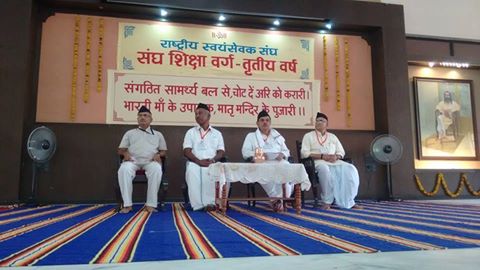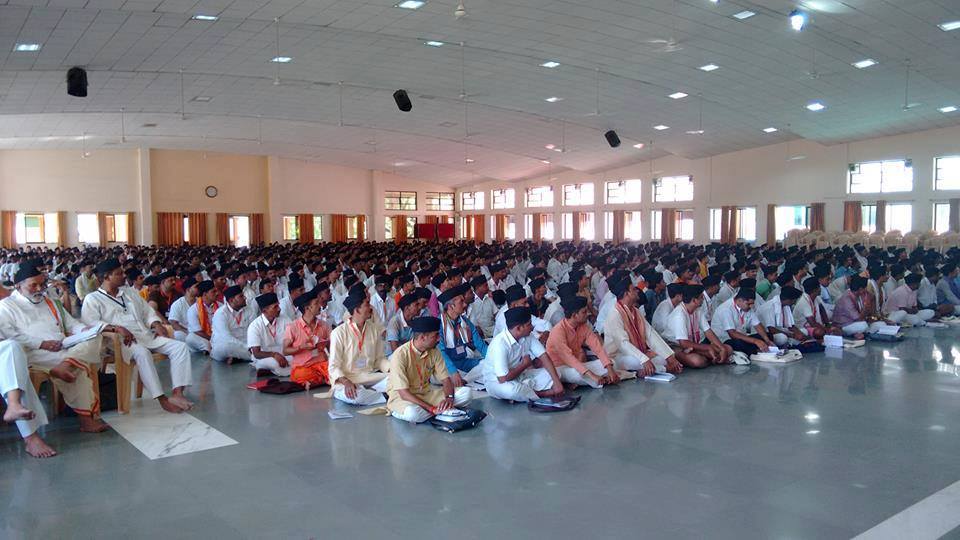VSK TN
Nagpur, May 16: “The annual
Third Year Training Camp of Rashtriya Swayamsevak Sangh (RSS) provides an
opportunity to all the participants to know, understand, experience and imbibe
‘Bharat’ in their hearts”, observed Dattatreya Hosabale, RSS Sah-Sarkaryawah
here on Monday.
Third Year Training Camp of Rashtriya Swayamsevak Sangh (RSS) provides an
opportunity to all the participants to know, understand, experience and imbibe
‘Bharat’ in their hearts”, observed Dattatreya Hosabale, RSS Sah-Sarkaryawah
here on Monday.
He was delivering the inaugural address after
formally opening the 25-day long Third Year Summer Training Camp known as
‘Sangh Shiksha Varg’ in RSS parlance here at Dr Hedgewar Smriti Bhavan
Reshimbag premises.
formally opening the 25-day long Third Year Summer Training Camp known as
‘Sangh Shiksha Varg’ in RSS parlance here at Dr Hedgewar Smriti Bhavan
Reshimbag premises.
Sarvadhikari of the camp Prof Dr. Vanyarajan,
Varg Karyawah Harish Kulkarni, Guardian Adhikari Swant Ranjan and
Sahsarkaryawah Bhagayya were present on the dais. Over 800, youth swayamsevaks,
drawn from all the states of Bharat are participating in this training camp.
Varg Karyawah Harish Kulkarni, Guardian Adhikari Swant Ranjan and
Sahsarkaryawah Bhagayya were present on the dais. Over 800, youth swayamsevaks,
drawn from all the states of Bharat are participating in this training camp.
Hosabale said that this summer training camp
presents ‘mini-Bharat’ in itself as swayamsevaks drawn from various provinces,
speaking different tongues, having varied food and clothing habits and coming
from different climates stay together for 25 days, thus, providing a chance to
interact, learn and understand the real ‘Bharat’.
presents ‘mini-Bharat’ in itself as swayamsevaks drawn from various provinces,
speaking different tongues, having varied food and clothing habits and coming
from different climates stay together for 25 days, thus, providing a chance to
interact, learn and understand the real ‘Bharat’.
Hosabale said that RSS is not known for its
uniform or prayers, but it is known for its comprehensive, all-encompassing
attitude towards the diversity in Bharat and its attempt to understand and
experience the unity in that diversity. The RSS literature is available in each
language spoken in Bharat, the system of Sangh Shiksha Varg is same all over
the country yet it includes the distinguishing features of those different
provinces, spreading their fragrance all over.
uniform or prayers, but it is known for its comprehensive, all-encompassing
attitude towards the diversity in Bharat and its attempt to understand and
experience the unity in that diversity. The RSS literature is available in each
language spoken in Bharat, the system of Sangh Shiksha Varg is same all over
the country yet it includes the distinguishing features of those different
provinces, spreading their fragrance all over.
He said that the training imparted to
swayamsevaks in this training camp empowers them to experience Bharat with all
its diverse peculiarities and distinctions. Recalling Swami Ramtirth’s analogy
with Bharat Hosabale said the Swami used to say: “Bharat is my body,
Kanyakumari is my feet, Himalaya is my head, the Ganga flows through my hairs,
Brahmaputra and Sindhu originate from my both hands, Vindhyachal is my
waistline, Coromandel is my right leg and Malabar is left. I am Bharat in its
wholeness…”.
swayamsevaks in this training camp empowers them to experience Bharat with all
its diverse peculiarities and distinctions. Recalling Swami Ramtirth’s analogy
with Bharat Hosabale said the Swami used to say: “Bharat is my body,
Kanyakumari is my feet, Himalaya is my head, the Ganga flows through my hairs,
Brahmaputra and Sindhu originate from my both hands, Vindhyachal is my
waistline, Coromandel is my right leg and Malabar is left. I am Bharat in its
wholeness…”.
Quoting this Hosabale asked the participants
whether they would be able to experience Bharat like the Swami did?
whether they would be able to experience Bharat like the Swami did?
Tracing the history of the summer training camps
in RSS, Hosabale said the RSS summer training camps have a special position in
the RSS annals of history with their distinguishing tradition and history. He
said that earlier the duration of the camps used to be 40 days which was later
reduced to a month and further to 25 days. This means that besides the syllabus
that used to be taught in 40 days is now completed and learned by the
participants in 25 days.
in RSS, Hosabale said the RSS summer training camps have a special position in
the RSS annals of history with their distinguishing tradition and history. He
said that earlier the duration of the camps used to be 40 days which was later
reduced to a month and further to 25 days. This means that besides the syllabus
that used to be taught in 40 days is now completed and learned by the
participants in 25 days.
The RSS Sah-Sarkaryawah said that though the RSS
was started in 1925, the daily shakha began in 1926 and the training camp
started in 1929. In those days, this was known as ‘Officers’ Training Camp’
(OTC). The camp which initially began in Nagpur later spread to different cities
Pune having the honor of being number two in the hierarchy. The RSS founder Dr.
Keshav Baliram Hedgewar used to visit both the camps. The 1940 camp at Nagpur
where swayamsevaks from all provinces participated, was the first such camp
held in Dr. Hedgewar’s presence.
was started in 1925, the daily shakha began in 1926 and the training camp
started in 1929. In those days, this was known as ‘Officers’ Training Camp’
(OTC). The camp which initially began in Nagpur later spread to different cities
Pune having the honor of being number two in the hierarchy. The RSS founder Dr.
Keshav Baliram Hedgewar used to visit both the camps. The 1940 camp at Nagpur
where swayamsevaks from all provinces participated, was the first such camp
held in Dr. Hedgewar’s presence.
Hosabale said that though the RSS completed 90
years of its existence, this 2016 Sangh Shiksha Varg may be the 82nd
summer camp. This is mainly because the camps could not be held in 1948 and 49
when the RSS was banned; later during the 1975-77 internal emergency as the
organization was banned again and also during the third ban imposed in the
aftermath of the demolition of disputed structure at Ayodhya in 1992-93.
years of its existence, this 2016 Sangh Shiksha Varg may be the 82nd
summer camp. This is mainly because the camps could not be held in 1948 and 49
when the RSS was banned; later during the 1975-77 internal emergency as the
organization was banned again and also during the third ban imposed in the
aftermath of the demolition of disputed structure at Ayodhya in 1992-93.
Hosabale said that after completing this training
no degree is given to the swayamsevaks, but this training is necessary for them
so that they can perform their roles more effectively. It is expected of them
that they remain ever committed to RSS mission and engage themselves in this
mission lifelong.
no degree is given to the swayamsevaks, but this training is necessary for them
so that they can perform their roles more effectively. It is expected of them
that they remain ever committed to RSS mission and engage themselves in this
mission lifelong.
He appealed to the participating swayamsevaks to
take advantage of this ‘sadhana’ and ‘tapasya’ of Sangh Shiksha Varg’ and
enhance their life along with RSS mission and vow to follow this lifelong.
take advantage of this ‘sadhana’ and ‘tapasya’ of Sangh Shiksha Varg’ and
enhance their life along with RSS mission and vow to follow this lifelong.
Senior RSS functionaries including Sarsanghchalak
Dr. Bhagwat, Sarkaryawah Bhayyaji Joshi will be guiding the participants in
different aspects of RSS ideology and philosophy during the training camp.
(Newsbharati)
Dr. Bhagwat, Sarkaryawah Bhayyaji Joshi will be guiding the participants in
different aspects of RSS ideology and philosophy during the training camp.
(Newsbharati)



